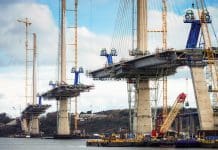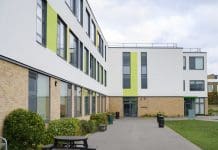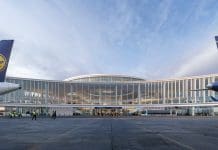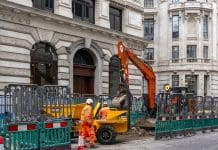HS2’s enabling works contractor, a Costain and Skanska joint venture (CSjv), working with subcontractors Keltbray, has completed two major demolition projects at Euston
The clearance of the buildings to the west of the station reveals, for the first time, the scale of the new platforms and concourse that will be built as part of the HS2 project.
The 6-month demolition of the former Ibis hotel on Cardington Street, was recently completed. The demolition of the 5-storey, 380 room building, involved the removal of almost 9,000 tonnes of material with 95% set to be recycled or reused on site.
The clearance of the nearby disused National Temperance Hospital buildings was delivered in two stages. More than 6,000 tonnes of material was removed during the demolition project with 95% set to be recycled or reused.
Two time capsules, discovered during the work, are being conserved by HS2’s archaeological subcontractors and will be kept for future study and display in the community.
CSjv and Keltbray used a top-down demolition technique, with machines lifted onto the top of the buildings and protective screening around the outside to limit noise and dust.
HS2 Ltd’s Euston programme director, Rob Carr, said: “HS2 will transform Euston, delivering much-needed extra capacity, improving journeys and unlocking the opportunity for thousands of new jobs and homes.
“Across the capital, we are making strong progress, with our pioneering archaeological programme in full swing and more than two-thirds of demolitions now complete.”
CSjv programme director, Peter Jones, said: “Costain and Skanska’s HS2 teams are making significant progress across London and we are pleased to confirm the successful completion of these two key building demolitions.
“We currently have more than a thousand people on site in the Euston area, working on a further 25 projects, most of which will be completed this year.”
The work is part of HS2’s enabling works contracts, which involve archaeology, demolitions and clearance, utilities and work to deliver new tree planting and wildlife habitats as part of HS2’s ‘green corridor’ project.














